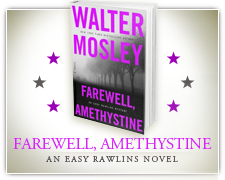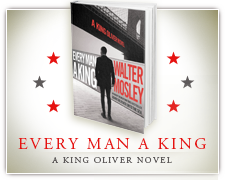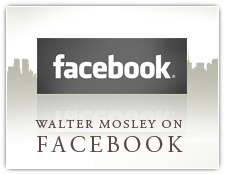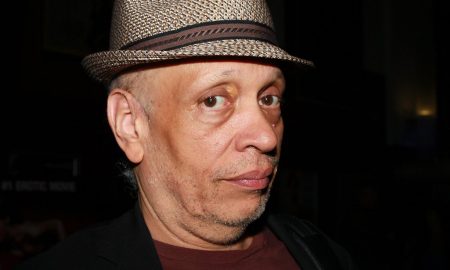Walter Mosley: ‘Donald Trump is a lazy, spoilt guy’
As his latest detective novel drops, the writer muses on Obama, the Clintons, and how his own father is like his celebrated protagonist, Easy Rawlins
During the 1992 presidential campaign, Bill Clinton flashed a copy of Walter Mosley’s Devil in a Blue Dress and proclaimed the writer his favorite novelist, shooting Mosley to mainstream fame. Now Mosley’s legendary Los Angeles detective Ezekiel “Easy” Porterhouse Rawlins, played by Denzel Washington in a 1995 film adaptation of Devil in a Blue Dress, is celebrating his 25th anniversary in Mosley’s new novel, Charcoal Joe.
“Bill was a really smart guy. He knew my books better than I did,” Mosley says in his soothing baritone, talking to me from St Louis on Charcoal Joe’s release tour. “He read them very closely. We were sitting at dinner one day and he was talking about how the books were about migration. Clinton was talking about how these characters had moved, and in that new place had created a place of power.” Mosley says that he strongly disagrees with some of Clinton’s policies, though he remains a supporter.
In fact, Mosley believes Toni Morrison’s contention that Clinton was America’s first black president, partly because Clinton grew up poor and disadvantaged, was on the money: “Working-class, southern, very close to being black … deeply influenced by black culture.”
But he is fonder of the country’s actual first black president. “I know Barack Obama must really be virtuous. I know the Republicans have hired 10,000 detectives to find one thing he did wrong in his life. And they haven’t done it in eight years. I’m amazed.” Obama’s legacy is gathering momentum, Mosley says. “He’s been the most clearly committed president to bring together the disparate factions of American democracy, to form and forge a better America and a better world. He failed at that, but he really tried. He’s a black man who got elected as president, twice. That’s outrageous.
“Obama’s really smart. Obama’s attacks on Trump are incredibly eloquent. It’s bad enough that we’re running around saying Muslims did this, Muslims did that, like it’s [all Muslims are] one guy. It’s one isolated group in the Middle East [Isis] that we created through our warmongering.”
Mosley also believes black people will mobilise to elect Hillary. “Hillary is not Bill. They’re two different people. I don’t think the identity is the same. [But] very few people of color in the United States see Donald Trump as a valid option. Bill supporting Hillary, coming out and getting out the vote, will be very useful.”
He agrees Trump’s campaign symbolises Philip Roth’s old contention that American reality out-fictionalises fiction. “It’s hard to believe that this person is running for president. I don’t believe Donald Trump has enough awareness of anything outside of himself to actually be racist. You actually have to think about other people in order to be racist. I don’t think Trump is capable of that. He’s a lazy, spoilt guy.”
Mosley evangelists now range from Samuel L Jackson to Junot Díaz, the latter of whom once called Mosley “a national treasure” in the Austin Chronicle. His 50 books include the political nonfiction tracts 12 Steps Towards Political Revelation, What Next: A Memoir Towards World Peace, and Workin’ on the Chain Gang. His best known work – his 14 Easy Rawlins novels – raise the issue of police brutality. “I’ve been writing about it for 25 years. For 450 years, the police ran rampant on black individuals, black souls. They would attack them, beat them, kill them … if you don’t have a camera image, then you don’t know what is happenin’.”
Mosley’s complaints, like Easy’s, include America’s prison-industrial complex and “war on drugs”. “It’s ridiculous,” he exclaims wearily. “You have millions of people in prison in America, and three times that number cycling in and out of prisons … some guy when he was 28 years old who was selling some meth somewhere. Alright, that’s not so good, but … how much money do I have to pay to keep them incarcerated?”
In fact, Easy’s post-second world war migration from southern poverty to stylish private detective in Los Angeles, fighting for “for justice in an unjust world”, echoes Mosley’s father Leroy’s journey from Louisiana to southern California. Leroy remains the 64-year-old New Yorker’s biggest inspiration. “My father was a great guy. He had an indomitable spirit. He taught me about love and responsibility, about beauty, and how to make gumbo.” Leroy cooked their family’s dinner every night. “Because my father’s entire life was so hard, he self-medicated, in a lot of different ways,” Mosley adds. “He loved cooking; it always made him feel better.”
Leroy Mosley also had the playful sense of humour that his son displays in our conversation. Mosley won a Grammy writing liner notes for Richard Pryor collection And It’s Deep Too! “Richard Pryor was a great thinker. He really understood society, and he understood it through his own pain,” Mosley says. “Richard Pryor’s politics are always about love … His relationship to the crack pipe and Jim Brown trying to pull him out of that misery. I don’t really know any contemporary comedians who get as close to the bone as Richard Pryor.”
Mosley himself is a former alcoholic and cigarette smoker. What did he replace those habits with? “Meditation.”
In Charcoal Joe, Mosley’s empathy toward the sex workers Augusta Tryman and Lolo Bowles is striking. American capitalism has “enslaved all workers”, Mosley says, energized by the subject of politics. “All I know is when you’re in America, there is no retirement. You are going to work until you die. I was talking toKareem Abdul- Jabbar last night, and he was saying that his grandfather was working in construction at a big building downtown, and he died at work, of colon cancer.
“Now, you know how much colon cancer hurts? And he was at work! At the very end of colon cancer. He just fell dead. That’s where we are again.”
(via theguardian.com)






